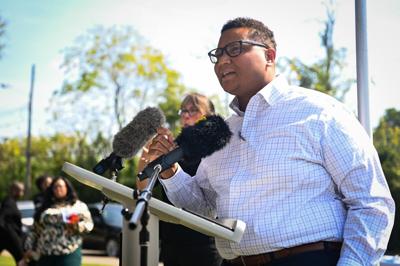Metro is looking for a consultant to provide community engagement services for North Nashville and the Jefferson Street corridor, including another look at a possible interstate cap.
In a request for proposals released on Oct. 31, Metro said it is looking for the consultant to “gather meaningful input on potential future planning needs and initiatives within the North Nashville Community Plan area.” It also asks for the consultant to provide a Federal Highway Administration Planning and Environment Linkages study for the Jefferson Street corridor.
The request mentions the previously proposed Jefferson Street Cap, which stalled in 2021 after community requests for more engagement in the process.
This time, the consultant would be expected to help educate the public about what an interstate cap would look like and what alternatives could be.
“One of the things that happened was it was something that just kind of came about that didn't have a lot of education around it,” Metro Councilmember Brandon Taylor, whose District 21 includes the area where the proposed cap would have been, says. “All of those questions that I think were unanswered in the last approach need to be answered.”
The new request notes that between October 2021 and February 2022, the Nashville Department of Transportation and Multimodal Infrastructure “discovered the engagement process needed to include a more robust strategy that would include conversations around land use and transportation, both heavily impacted by urban renewal and the interstate system.”
“I think we could’ve done a better job of listening to the community and making sure North Nashville got to talk about the issues that really matter to them first instead of just throwing down an interstate project,” Eric Brown, who was former Mayor John Cooper's North Nashville economic and community development manager, told Scene sister publication the Nashville Post last year.
The historically Black area of North Nashville faced displacement and disruption when Interstate 40 was built in the 1960s through the middle of the community, severing Jefferson Street, the historic heart of Black Nashville. The Jefferson Street Cap, designed to cover the interstate with newly usable space, was championed by Cooper and others as a way of healing that wound. The request notes the construction of the interstate “physically separated the community and razed entire neighborhoods,” while the area is now seeing increased redevelopment.
“If reconnecting this community to the rest of the city is to help build and strengthen the community with the people that's here, that's exactly what we want to do,” Taylor says. “We don't necessarily want to have a lot of displacement into the growth. Hopefully the study can give us a broad view as well as help us kind of manage our blind spots.”
The councilmember said his understanding is that this effort does not move the previous cap project forward but instead is a new opportunity for the community to engage with Metro on what the future plans for the area should be.
As envisioned in 2021, the cap would have served as a 3.4-acre land bridge between Jefferson and Scovel streets, running from D.B. Todd Boulevard to 14th Avenue North. The project was estimated at the time to cost $120 million, with involvement from Metro, the state and the federal government.
“This is a huge opportunity for an investment in this part of town and this community where we have been divested in for decades,” Taylor says. “What we heard was, ‘We want to be a part of what type of investments come to this community,’ and I think this is the first step in doing so.”
The scope of the new project includes a full report on the Jefferson Street Cap’s purpose, anti-displacement strategies, existing conditions, alternatives, economic impact and environmental, engineering and cost feasibility. The consultant is also tasked with providing community-based planning recommendations for Metro and identifying trends with an emphasis on equity and accessibility for topics such as housing, campus planning, transportation and public health. The project hinges on public engagement, with meetings, listening sessions and focus groups listed as the second task, behind only a project management plan.
“I see this as reconnecting the community and hopefully targeting opportunities for the people in this community,” Taylor says. “I think we can target the effort to increase for Black businesses, Black residents.”
The closing date for proposals is Nov. 21, and no date is given for when Metro intends to make a selection.
NDOT and the Metro Planning Department declined to comment because it is an open procurement period. Mayor Freddie O'Connell, until recently the councilmember for adjoining neighborhoods, also declined to comment.
This article was first published by our sister publication, the Nashville Post.





